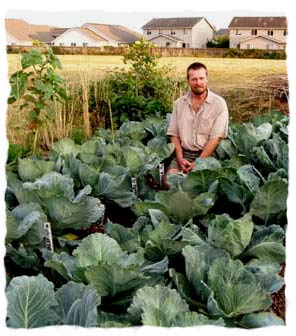
The following appears in the January/February 2007 issue of In Good Tilth under the title "Deconstructing Civilization with Cabbage."

"Crop varieties incorporate the values of their creators. When
you grow varieties bred by others, you propagate their values along with
their varieties. Today's professional plant breeders - university and
corporate - are breeding plants to facilitate and serve the modern megafarm
agribusiness pattern. These varieties produce well in huge moncultures
grown with massive doses of herbicides and chemical fertilizers. Bred
into the varieties are the values of their creators - that more is always
better, that monocultures are best, and that pollution, biodiversity,
and sustainability don't matter.
"It is time for new patterns - new patterns for agriculture, and
new patterns for plant breeding. It's time for the rising up of a new
generation of plant breeders out of the soil of our farms and gardens.
It is time for farmers and gardeners everywhere to take back our seeds,
to rediscover seed saving, and to practice our own plant breeding. It
is time to breed plants based upon an entirely different set of values."
- Carol Deppe, Breed Your Own Vegetable Varieties, Chelsea Green Publishing, 2000
Take a keen interest in evolutionary ontology and its trends, lessons
and ‘rules analogs’ become apparent everywhere. Look at the
World Wide Web and the Open-Source software movement for example - the
very same evolutionary pressures driving the irresistible tendency toward
designing greater openness into information technology systems are set
to take the plant breeding community by storm and in so doing will refashion
the fundamental fabric of that which sustains us.
What do I mean? Wendell Berry observes that we can have agriculture only within nature, and culture only within agriculture. It is food crops that sit at the very apex point of our most immediate interface with the green-world, hence our attitude and approach to co-evolving with our foods determines the essential nature of the meme-foundation of our lives – the behavior, no less, of our civilization.
No plant breeder worth their salt will pretend that the major imperative behind plant breeding strategies is not an economic one. This has had profound implications for the fundamental genetic structure of our world, as the vast majority of companies sell food crops that are not open-pollinated (OP). The overriding focus of recent decades has been on fashioning breeding techniques to create plants that are hybrids - life forms that are literally, structurally, proprietary. When we save seed from a hybrid, the 'temporary holding pattern' of a cross between two typically highly-inbred parents, and replant it, the resulting progeny is highly unstable. It does not breed true. What we get, instead, is a highly variable mess that also 'disguises' the genetic inheritance of the parental lines. Hence, farmers and competitors, see little benefit in 'growing out' hybrids. Hybrid vendors lock a recurring annual profit into the structure of life and their balance sheet.
Evidence strongly suggests that this model flies in the face of evolutionary trends. Not only do we see this in the fact that plants naturally tend toward greater OP-ness where they are able, we see it most particularly in the essential nature of hybrid behavior. Hybrids are inherently degenerative. They are designed to lack evolutionary resilience. Hybrids have no sense of place.
What it takes to raise food genotypes with a deepening capacity for co-evolving intelligently with local ecologies through the years, as distinct from 'self-destructing' after one season, isn't simply a question of tweaking our existing approach: it will require a fundamental re-engineering of our culture and the assumptions which sustain it. But as we move toward the evolutionary inevitability of inherently sustainable food-sheds, the plant breeding story moves center stage, as it provides us with a tangible, navigable cultural roadmap into the roots of authentic health.
Besides liking cabbage a great deal, this is the reason I’m growing thirty different varieties of winter cabbage just now, mostly hybrid, organically. I hope to let this array of characters cross, and to use the rich genetic interplay which results, a de-hybridizing 'grex' we call it, to provide the foundation for local, grassroots efforts to segregate out stable, ecologically resilient, open-pollinated winter cabbage varieties over the long-term.
Such an approach not only deconstructs the fundamental structural lockdown imposed by the economic diktats of hybridization, it also weans out the synthetic patterns imposed on the wheel of life by hybrid breeders. Conventional hybrids aren’t simply veggies, fundamentally ‘organic’, bred and grown using chemical fertilization and pest-management regimes. No. Most of the hybrids in our midst are Ctyoplasmic Male Sterility (CMS) hybrids. Inducing male sterility is a key plant-breeding technique and involves using chemical sprays and violent intervention techniques such as protoplast fusion – including the use of electric currents, for example - to control fertilization and unwanted pollination. CMS is not labeled.
Attuning our breeding approaches to better reflect "the irresistible march of evolution" as Teilhard de Chardin describes it, not only moves our food crops toward greater ecological resilience, it moves our culture as a whole, too. As Corvallis-based Carol Deppe astutely observes: "Crop varieties incorporate the values of their creators. When you grow varieties bred by others, you propagate their values along with their varieties.” The essence of effective cultural regeneration, in other words, will be underpinned by an evolution in the values informing food plant breeding. In deconstructing my hybrid cabbages, for example, I am doing nothing less than deconstructing the values which inform these varieties – along ecologically coherent lines. Put another way, by applying strategies and tactics that honor ecological truths as distinct from synthetic 'economic' falsehoods, we do nothing less than deconstruct civilization and refashion it in the image of freedom, openness, sharing and the regenerative power of Nature; because our approach to seed, of course, is a foundational archetype upon which our culture is sustained. Succeeding seceding seeding, you might call it.
Last updated, January 16, 2007